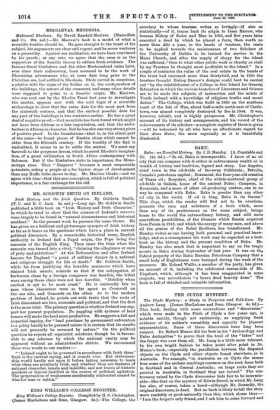MR. GOLDWIN SMITH ON IRELAND.
Irish History and the Irish. Question. By Goldwin Smith. (T. C. and E. C. Jack. 5s. net.)—Long ago Mr. Goldwin Smith published a little book on "Irish History and Irish Character," in which he tried to show that the sources of Ireland's sorrows were largely to be found in "natural circumstances and historical accident." In the present work he pursues the same theme. He has given us a brilliant and picturesque synopsis of Irish history so far as it bears on the questions which have a place in current political discussion. By a remarkable historical irony, English authority in Ireland had a Papal origin, the Pope being the suzerain of the English King. Then came the time when the suzerain was turned into a rival, "claiming the allegiance at once of piety and patriotism." At the Reformation and after Ireland became for England " a point of military danger in a national and religious struggle for life or death." Mr. Goldwin Smith, while far from justifying the horrible massacres which have stained Irish annals, reminds us that if the subjugation of barbarous clans by a foreign conqueror was horrible, the tribal wars among these clans were not less horrible. "Debility when excited is apt to be most crueL" He is eminently fair to men whose characters were so far apart as Cromwell on the one side, and Ormonde on the other. As to the modern problem of Ireland, he points out with truth that the roots of Irish discontent are two, economic and political, and that the first is the more vital. The primary question is whether Ireland can sup- port her present population. No juggling with systems of land tenure will make the land more productive. He suggests a full and impartial inquiry, for " land purchase by government subvention is a policy hardly to be pursued unless it is certain that its results will not presently be reversed by nature." On the political question he rejects all separatist solutions, though he is favour- able to any schemes by which the national vanity may be appeased without an administrative daticle. We recommend these wise words to our readers :- "' Ireland ought to be governed in accordance with Irish ideas.' Such is the current saying, and it sounds wise. But statesman- ship would hardly act upon it before taking measures to learn what ideas are peculiarly Irish, and whether they are features of national character, innate and indelible, and not traces of historic accident or fancies instilled in the course of political agitation. The perpetuation of weaknesses accidentally contracted cannot be wise for man or nation."


























































 Previous page
Previous page